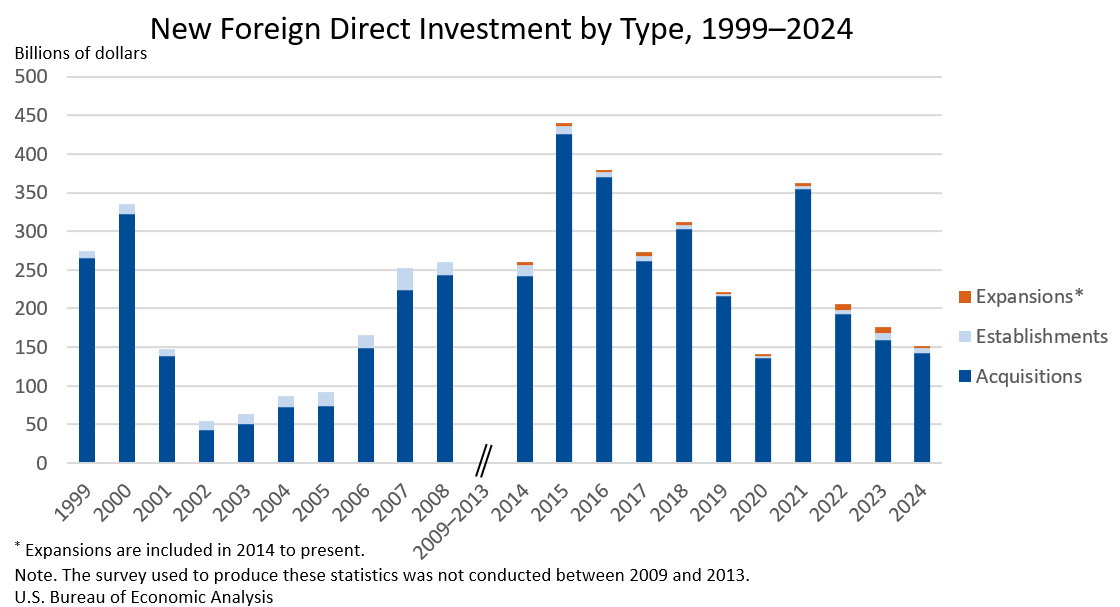Bureau of Economic Analysis
New Foreign Direct Investment in the United States, 2024
Expenditures by foreign direct investors to acquire, establish, or expand U.S. businesses totaled $151.0 billion in 2024, according to preliminary statistics released today by the U.S. Bureau of Economic Analysis. Expenditures decreased $24.9 billion, or 14.2 percent, from $176.0 billion (revised) in 2023 and were below the annual average of $277.2 billion for 2014–2023. As in previous years, acquisitions of existing U.S. businesses accounted for most of the expenditures.
Principal Federal Economic Indicators
Noteworthy
- 2025 News Release Schedule
- Innovation at BEA
- 2025 Annual Updates
- New! Services Trade Data for More Countries
- Data Tool: Trade in Value Added
- Distribution of State Personal Income
- Updated: RIMS II Regional Multipliers
- Arts and Culture
- Space Economy
- FDI Now in State BEARFACTS
- Quick Guide: Price Indexes
The Latest
Travel and Tourism Satellite Accounts, 1st Quarter and Annual 2009
QUARTERLY TOURISM ESTIMATES WILL NOT BE DISCONTINUED (SEE THE BOX NEXT RELEASE)
-->
-->
Real spending on travel and tourism declined at an annual rate of 5.9 percent in 2009:1 after decreasing 6.9 percent (revised) in 2008:4. By comparison, real gross domestic product (GDP) decreased 5.7 percent (preliminary) in 2009:1 after a decrease of 6.3 percent in 2008:4.
U.S. International Trade in Goods and Services, April 2009
NOTICE TO USERS OF THE CONSTANT DOLLAR (REAL) DATA SERIES The initial release of the April 2009 issue of the U.S. International Trade in Goods and Services report on June 10, 2009 at 8:30am contained incorrect 2009 statistics in Exhibits 10 and 11. The Census Bureau has identified and corrected a processing error that caused incorrect deflators to be applied to the revised data for 2009. The correct data for 2009 were posted on June 10, 2009…
Foreign Investors' Spending, 2008
Outlays by foreign direct investors to acquire or establish U.S. businesses increased 3 percent in 2008, to $260.4 billion. Outlays in 2008 were the third-largest on record and the sixth consecutive increase since a falloff in outlays in 2001-2002.
Gross Domestic Product by State, advance 2008 and revised 2005-2007
EMBARGOED UNTIL RELEASE AT 8:30 A.M. EDT, Tuesday, June 2, 2009
Personal Income and Outlays, April 2009
April 2009 Personal income increased $58.2 billion, or 0.5 percent, and disposable personal income (DPI) increased $121.8 billion, or 1.1 percent, inApril, according to the Bureau of Economic Analysis. Personal consumption expenditures (PCE) decreased $5.4 billion, or 0.1 percent. In March, personal income decreased $25.9 billion, or 0.2 percent, DPI increased $8.2 billion, or 0.1 percent, and PCE decreased $33.0 billion, or 0.3 percent,…
Gross Domestic Product, 1st quarter 2009 (preliminary) and Corporate Profits
Real gross domestic product -- the output of goods and services produced by labor and property located in the United States -- decreased at an annual rate of 5.7 percent in the first quarter of 2009, (that is, from the fourth quarter to the first quarter), according to preliminary estimates released by the Bureau of Economic Analysis. In the fourth quarter, real GDP decreased 6.3 percent. The GDP estimates released today are based on more…
U.S. International Trade in Goods and Services: March 2009
U.S. International Trade in Goods and Services DECEMBER 2007
-->
Personal Income and Outlays, March 2009
March 2009 Personal income decreased $34.4 billion, or 0.3 percent, and disposable personal income (DPI) decreased $1.8 billion, or less than 0.1 percent, inMarch, according to the Bureau of Economic Analysis. Personal consumption expenditures (PCE) decreased $24.2 billion, or 0.2 percent.
Gross Domestic Product, 1st quarter 2009 (advance)
Real gross domestic product -- the output of goods and services produced by labor and property located in the United States -- decreased at an annual rate of 6.1 percent in the first quarter of 2009, (that is, from the fourth quarter to the first quarter), according to advance estimates released by the Bureau of Economic Analysis.
Advance Gross Domestic Product by Industry, 2008
Advance GDP by Industry Statistics
Downturns in manufacturing, retail trade, and finance and insurance industries were the leading contributors to the slowdown in U.S. economic growth in 2008, according to preliminary statistics on the breakout of real gross domestic product (GDP) by industry from the Bureau of Economic Analysis. The economic slowdown was widespread: nearly two-thirds of private industries contributed to the deceleration in…




